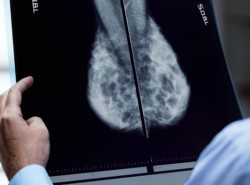
Working towards a prevention strategy for individuals with a faulty BRCA2 gene
Published: 04/30/24 8:24 AM

Jane Visvader
Project Description:
While the increased lifelong risk of breast cancer is well recognised for individuals with a BRCA2 mutation, there have been limited options for effective risk reduction strategies or therapeutic interventions. In this NBCF-funded study, Prof Jane Visvader aims to identify targetable cellular pathways in precancerous BRCA2 mutant cells to develop preventive therapies, and new therapeutic targets for the treatment of BRCA2 mutations carriers that develop breast cancer.
Why is this work needed:
Approximately one in 400 women inherits a mutated BRCA2 gene which carries a 70% lifetime risk of developing breast cancer. Limited preventative options and lack of effective therapeutics present a challenge for these individuals and their effected family members. A greater understanding of the changes that occur as breast cells with BRCA2 gene mutation transition from a precancerous to a cancerous stage will pave the way for better preventive strategies and improved targeted therapies for these individuals.
Expected outcomes:
Successful outcome of this study will identify the earliest molecular changes in the transition from the precancerous to the cancerous stage and thus provide targetable markers of disease suitable for the prevention or treatment of BRCA2 mutation carriers. Targeted interventions with a focus on preventing tumour development or treating early-stage disease are likely to provide the greatest benefit in reducing breast cancer related deaths.
Project description:
In families, hereditary mutations (gene errors passed down through generations) in the BRCA2 gene are linked to one of the highest lifetime risks (70%) of developing breast cancer. Rigorous annual screening starts in BRCA2 mutation carriers from about age 30 to detect early cancers, as tumours often arise in younger women and tend to be clinically aggressive. Besides mastectomy and possibly tamoxifen treatment, very few preventive options are available for BRCA2 mutation carriers, highlighting an unmet need for improved prevention strategies.
In this NBCF-funded study Prof Jane Visvader from the Walter and Eliza Institute of Medical Research will use state-of-the art technologies to examine at the single cell level the earliest molecular changes in breast cells from BRCA2 mutation carriers and their interactions with the immune microenvironment as cells transition from a precancerous to cancerous stage. This information will be used to test drugs in preclinical models, generated from patients’ derived tissue samples, that recapitulate BRCA2 mutation-associated breast cancer. The information gained has the potential to reveal new precision prevention strategies in addition to novel biomarkers and therapeutic targets for BRCA2 mutation carriers.
